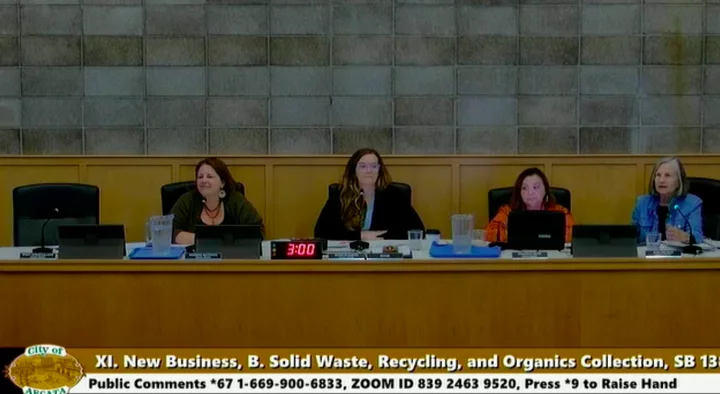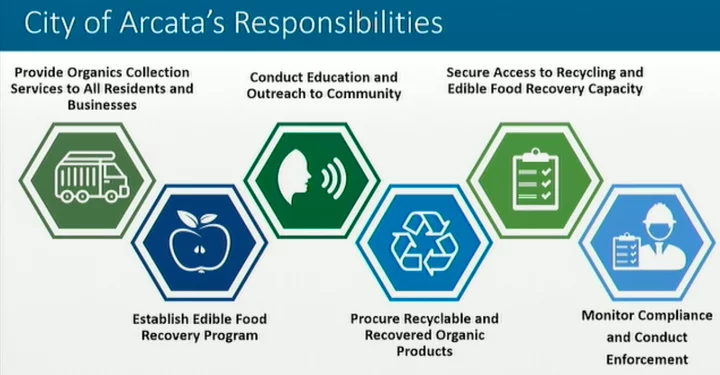Arcata City Council members (from left) Meredith Matthews, Sarah Schaefer, Kimberly White & Alex Stillman (Stacy Atkins-Salazar absent) | Images: screenshots from online meeting video
PREVIOUSLY
- Humboldt Prepares for California’s Extensive Organic Waste Bill That Will Require Us to Start Composting, Among Other Things
- Arcata City Council Introduces Ordinance That Will Mandate Composting Your Food Scraps (By Yourself, or Through a Service) to Comply With State’s Organic Waste Bill
- Arcata City Council Adopts Revised Budget, Approves Agreement With HWMA for Composting Organic Waste
- Ready to Compost Yet? Arcata City Council to Discuss Agreement with Recology for City-Wide Curbside Pickup Service for Organic Waste
###
It’s time to start thinking about composting (if you don’t already) because soon the City of Arcata will require curbside pickup for organic waste to bring the city into compliance with California’s Short-Lived Climate Pollutant Reduction Strategy, SB 1383.
Okay, so it will probably be a couple of years before Arcata actually rolls out the composting service. But on Wednesday night the Arcata City Council (minus Councilmember Stacy Atkins-Salazar, who was absent) took one of many steps needed to begin citywide composting by authorizing city staff to draft a franchise agreement with Recology for the service.
Emily Benvie, Arcata’s deputy director of environmental and community services, began by giving the council some background on the city’s current franchise agreement with Recology, which expires in 2029. Currently Recology provides universal curbside collection for trash, recycling and green waste – which includes yard waste, but not food scraps or other compostables. In exchange for being the City’s service provider, Recology gives the City 10 percent of its revenue as a “franchise fee,” Benvie said. This comes to approximately $400,000 annually, which the city puts toward street repair (to offset the wear and tear from Recology’s trucks) and toward other city cleanup programs such as park cleanups and graffiti removal.
In addition to adding organic waste pickup service, the new franchise agreement will address other aspects of waste management, including the bulky item pickup offered to residents, the frequency of pickup service, providing additional small kitchen food scrap bins for residents and education and outreach about the services.
The different components of SB 1383 that Arcata must undertake
Of course there is the issue of rate increase and the bad news, Benvie explained, is that Recolgy is already anticipating raising its rates just to maintain its current level of service. Recology transports waste to the Eureka Transfer Station (aka, the dump) operated by the Humboldt Waste Management Authority (HWMA), which estimates a 26 percent increase in tipping fees – the fees that waste management facilities have to pay to put waste into the landfill. HWMA is also increasing its processing fees by about 57 percent, Benvie said.
This means that Recology will have to pay more money to HWMA and, in turn, residents will need to pay more to Recology. Benvie said that the average rate increase will be about four dollars per household per month for the current services that Recology provides. How much people will have to pay additionally for the organic waste pickup is still unclear, Arcata City Manager Karen Diemer said, but staff anticipates about an additional 30 percent increase in costs.
The agreement will also carve out a space for the businesses already providing organic waste pickup, which includes Local Worm Guy and Full Cycle Compost. Under the new agreement, these businesses will be permitted to process up to 10 percent of the city’s organic waste and residents who already pay for those services will be able to opt out of the citywide compost pickup.
However, since the way SB 1383 is written requires residents to use a curbside pickup service, there will likely not be an option for residents and businesses who do their own composting to opt out of the service.
During public comment several community members expressed concern over the fact that people who do their own composting will still have to pay for the curbside collection. “I compost [at home]…Everything I compost can go in my garden,” one commenter said to the council. “It’s really sad that there’s no option for us, that we’re mandated to do something that we don’t need to do.”
Under the new service Recology will likely allow yard waste and food scraps to be combined into one green bin, Benvie explained, so many residents will likely be able to still use the service for their yard waste. Benvie also mentioned that people will be able to place bones and meat in the bins, which some people don’t want to put in their own home compost.
There were also concerns about how the rate increase will disproportionately affect low-income residents. Councilmember Meredith Matthews said she understands that concern and hopes that the city will look at subsidizing costs for low-income people in the future.
The franchise agreement is expected to return to the council for review this fall. Because it will take a while for Recology to make the necessary capital improvements, roll-out of the collection service will not begin until fall 2025. Benvie was clear that the community will receive notice of the rate increases, and that no one will be paying for the organic waste collection until the service begins.


CLICK TO MANAGE